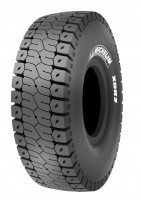Cooper Tire reports “promising” guayule rubber test results
Scientists working on Cooper Tire & Rubber’s guayule rubber project have reportedly reached a key milestone on the path to producing, by mid-2017, a concept tyre in which guayule-based polymers replace all natural and synthetic rubbers. Their testing has shown guayule to be an effective substitute material in certain components, with tyres produced using these components offering comparative performance to their conventional counterparts.
To date, Cooper has completed a number of tyre builds to test the replacement of Hevea and petroleum-sourced rubber in various components and has tested each individual build for overall performance. At the recent annual meeting of the public-private consortium behind the Cooper-led ‘Securing the Future of Natural Rubber—an American Tire and Bioenergy Platform from Guayule’ research and development grant, the tyre maker stated it has tested almost all tyre components with “promising results.”
“We have nearly finished our work on developing guayule-based tyre components and have tested these tyres to assure a full performance evaluation,” Chuck Yurkovich, Cooper’s senior vice-president of global research and development, told consortium members. “The results are highly promising. We have proven that we can replace traditional polymers with guayule in certain components, and that tyres made from these components perform equal to conventional tyres. We are optimising the use of guayule formulations to develop not only a full guayule tyre, but we will also evaluate guayule blends in certain components where an advantage has been shown to exist.”
Tests using guayule components are a prelude to the production and extensive evaluation of a 100 per cent guayule-based concept tyre. At the same time, Cooper Tire – who has served as the guayule consortium’s lead agency since receipt of a five-year Biomass Research and Development Initiative grant from the United States Department of Agriculture (USDA) and the US Department of Energy in 2012 – will continue to study the potential future commercialisation of guayule-based tyres.
Other partners also brought the consortium up to date about their ongoing research. The USDA’s Agricultural Research Service (ARS) reported its tests indicate that drip irrigation is the most effective method of driving higher rubber yield per hectare in desert regions. The ARS also shared on its work to sequence the guayule genome, which so far has resulted in three patent disclosures on the genome; these will be submitted to the US Patent Office. “We now have the first-ever assembly of the guayule plant genome,” said Colleen McMahan, Ph.D., research chemist, ARS, Western Regional Research Laboratory. “This resource, and the advanced breeding tools from Cornell, will benefit breeders for decades to come through agricultural innovations.”
The BRDI annual meeting also included a report from Clemson University, which is responsible for studying the environmental impacts of the entire tyre life cycle using guayule versus traditional Hevea rubber in tyre production. Clemson announced the completion of early work on the development of a computer-based Life Cycle Analysis programme for guayule-based tyres that will help quantify the sustainability of the effort from genome to tyre production and through to product service life and disposal. The university stated that its work shows guayule to be a sustainable, US-based rubber source.
Grant partner PanAridus is the project’s raw materials supplier. The company has developed varieties of guayule with increased rubber content and has pioneered direct seeding methods, agronomics and co-product markets. At the meeting, PanAridus provided an update on its role in production of rubber for use in the tyre industry and its collaboration with Cooper to develop a proprietary solvent-based process to extract rubber from guayule plants. Under its work on the grant, PanAridus has produced rubber in quantities never before achieved for use in tyres; this rubber has been supplied to Cooper for its work in the tyre builds and testing.
“It has been our mission at PanAridus to commercialise guayule from the farm gate to market development of raw materials produced from the plant,” commented PanAridus chief executive officer Mike Fraley. “Hevea is currently the only commercial source of natural rubber available. The tyre industry needs another source and the United States needs an economic, sustainable and stable alternative. With the dedicated research efforts of Cooper, it is unprecedented to see that guayule has been demonstrated to meet requirements for the very vibrant tyre industry.”



Comments